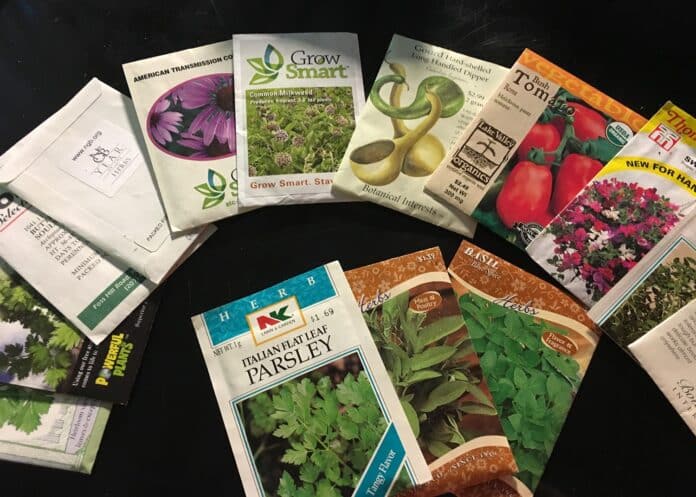

As you pack away the garden hose, tools and other supplies or transition to your winter garden, do not overlook those leftover seeds. Proper storage can extend their life so you will need to buy fewer seeds next season. With another shortage of garden seeds predicted for 2021 you will be glad you did.
Leave the seeds in their original packet whenever possible. It contains all the information you need to make planting easier and increase your success next season.
Place the seed packets in an airtight container such as a recycled jar or plastic storage container. If you have lots of seeds, consider organizing them as you pack them away for winter.
Arrange them alphabetically from A to Z using dividers for each letter of the alphabet or organize them by planting season. Group seeds to be started indoors together and those that go directly in the garden by the month they should be planted.
Seal the lid on the container and place in a cool, dark location. The refrigerator is perfect, providing consistently cool temperature that increases seed storage success.
The longevity of a seed not only depends on proper storage, but also varies with the type of seed.
Eggplant, muskmelon, and Brussels sprouts will last five years or more while onions and parsnips may only last a year. Give leftover flower seeds the same care. Heliotrope, verbena, sweet William, geraniums, and Shasta daisies typically last one or two years.
Impatiens, Geums and Tithonia (Mexican sunflower) usually maintain viability for two years while ageratum, alyssum, amaranth and yarrow can last four years or more.
Take an inventory of your seeds as you pack them away in storage. Reference this list as you begin planning next year’s garden. You will be able to see what seeds you already have and focus on those you need.
If you have extras or seeds you do not plan to use, consider sharing some with a friend. Most of us do not need to plant all 20, 30 or more seeds in a packet. Sharing and trading with friends or donating to schools, community gardens, master gardeners, or other groups that may lack the resources to buy their own seeds is a great way to make a difference. Everyone will save money while growing beautiful and productive gardens.
Do not discard older seeds. They often outlast the average and continue to sprout at an acceptable level. You can test the seeds prior to planting. Just take ten seeds and wrap them in a damp paper towel. Then place in a plastic bag and wait to check for sprouting in a week or two. If all the seeds sprout, you can plant according to the packet. If only half sprout, you need to seed twice as thick.
And if you find some of your old seeds are no longer viable, use them to create seed art and other projects. It is a fun way to repurpose these seeds.
Be sure to add packing up leftover seeds to your fall to-do list. You will be glad you did when it is time to plan and plant next year’s garden.

















